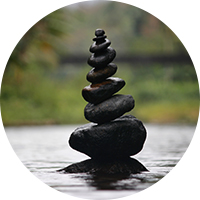닫기
카테고리버튼
Water story
Jinhaeng Waterway, a company that cares about customer health and nature's health
Mineral
01What is a mineral?
It is one of the five essential nutrients. Mineral, as well as oxygen, nitrogen, hydrogen, and carbon, is a basic unit composing a life.
As it cannot be synthesized in our body, the essential mineral must be supplied from the outside.
Maintaining a pH balance in our body
It is best to keep the pH level of our bodies between 7.2 and 7.6, which is the level close to that of a mother's amniotic fluid.
Drinking acidic or alkaline water excessively and constantly will increase your risk of exposure to many diseases because your body balance is broken.

02Types and roles of minerals
Essential minerals
- CaCalcium Calcium As the most abundant minerals in the water, it is needed for skeletal and dental formation, enzyme activation, muscle contraction, and mental stability
- MgMagnesium Magnesium It helps the action of calcium, prevents the calcium from dissolving and leaving from bones, improves constipation, restores fatigue, smoothes blood flow, and helps oxygen activation.
- NaSodium Sodium It is highly present in extracellular fluid, facilitates nutrition and waste transfer, and promotes metabolism
- KPotassium Potassium It makes interaction with sodium to maintain the osmotic pressure of the fluid and helps smooth the nerve transmission. It also suppress hypertension caused by excessive sodium
- SeSelenium Selenium It is one of the essential minerals for growth. It gives anti-oxidation, and prevents arteriosclerosis, cancer and menopausal disorders due to cell oxidation
- ZnZinc Zinc It makes activation of metabolism and hormones, helps skin and skeletal growth and maintenance.
Rare element
- Cr3+Chromium 3 Chromium 3 It helps insulin pull blood sugar into cells, thereby lowering a blood cholesterol level.
- SrStrontium Strontium It is a calcium-like component that accumulates in the bone, promotes bone growth, and increases bone mineral density
- LaLanthanum Lanthanum It has an improvement effect on hyperinsulinemia caused by the strengthening of cell membrane function
- GeGermanium 게르마늄 Facilitating the production of interferon, thus activating immune cells, helping to supply oxygen and antioxidant action.
03Mineral deficiency
When river or sea water evaporates, it becomes a pure water vapor form. Various minerals are contained in the water through the circulation process of water.
Although you can absorb a lot of minerals from water, 1/3 of the world's population are suffering from mineral deficiency
Why are people suffering from mineral deficiency?
-
 First
Soil erosion by water
First
Soil erosion by water
-
 Second
Use of pesticides, fertilizers and herbicides
Second
Use of pesticides, fertilizers and herbicides
-
 Third
Lack of nutrients in plants grown on land
Third
Lack of nutrients in plants grown on land
-
Changes in major minerals contained in apples for the last 80 years
Mineral 1914년 1963년 1992년 %('14 ~ '92) Calcium 13.5㎎ 7.0㎎ 7.0㎎ -48.15 Magnesium 28.9㎎ 8.0㎎ 5.0㎎ -82.70 Potassium 117.0㎎ 110.0㎎ 115.0㎎ -1.71 Phosphorus 45.2㎎ 10.0㎎ 7.0㎎ -84.51 Iron 4.6㎎ 0.3㎎ 0.18㎎ -96.09 Source : Lindlaar, 1914 : USDA, 1963 and 1992
-
Changes in major minerals contained in fruit and vegetables, Japan Science and Technology Agency
Minerals iron Calcium 52년 82년 93년 52년 82년 93년 Spinach 13 3.7 0.7 55 39 Tangerine 2 0.1 29 22 Chives 0.6 0.6 59 50 Pumpkin 0.6 0.6 24 10 Napa Cabbage 0.4 0.2 35 22 Cabbage 0.4 0.2 43 23
QAFrequently Asked Questions
-
- Answer 1
- The minerals in the water cannot be replaced by minerals in food. Mineral in water is at its ionic state, so it can be more easily absorbed into the human body than minerals in food. Therefore, water is a better neutralizer than vegetables or fruits.

- Question 1
- Minerals in food are enough supply for bodies?
-
- Answer 2
- The tastes of various kinds of water are different. Depending on the soil, climate, and temperature, water taste will change. Heavy water has a high mineral content and light water has a low mineral content.

- Question 2
- Do you feel the taste of water?
-
- Answer 3
- Only water of pH 5.8 (acid water) is allowed in Korea. Water of pH 5.8 to 8.5 is permitted as drinking water.

- Question 3
- What is the pH level of Korean water?
- TOP
- TOP
